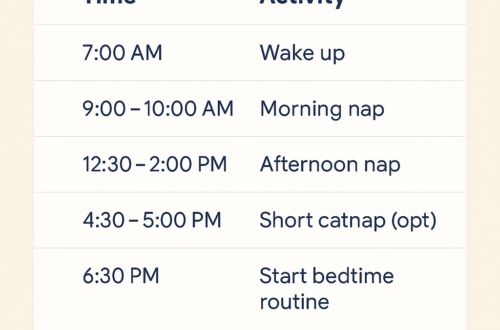Welcoming a newborn into the world is a beautiful, life-changing experience. But let’s be honest—between feedings, diaper changes, and those adorable midnight cries, sleep can feel like a distant dream. If you’re wondering how (or if) you can get your baby on a sleep schedule, you’re not alone.
While newborn sleep is unpredictable in the beginning, setting healthy sleep habits early can lay the foundation for better rest—for your baby and for you.
Understanding Newborn Sleep
Newborns (0–3 months) sleep a lot—typically 14 to 17 hours over a 24-hour period. But their sleep happens in short bursts because their tiny tummies need frequent feedings.
Here’s what to expect in the early weeks:
- Sleep is fragmented: Babies sleep in 2–4 hour stretches, day and night.
- They don’t know day from night: Their internal clocks (circadian rhythms) haven’t developed yet.
- Cues matter more than the clock: In the newborn stage, flexibility is key.
When Can You Start a Sleep Schedule?
Most pediatricians agree: newborns aren’t developmentally ready for a strict schedule. However, by 6–8 weeks, you can begin introducing a gentle sleep routine and start shaping a pattern.
Your goal is to build consistency—not rigid timing.
Sample Sleep Pattern for a Newborn (0–12 Weeks)
Note: Every baby is different, but here’s a loose example for a baby around 6 weeks old.
Morning (7–9 AM):
- Wake, feed, and have some awake time (10–30 minutes).
- First nap comes about 45–60 minutes after waking.
Midday:
- Feed every 2–3 hours.
- Naps usually follow 60–90 minutes of wake time.
Evening (6–8 PM):
- Begin a calming routine: dim lights, a warm bath, soft lullabies.
- Last nap of the day may be shorter.
- Aim for bedtime between 8–10 PM.
Overnight:
- Wake for feeds every 2–4 hours.
- Keep lights low and interaction minimal to encourage night-sleep association.
Tips for Building Healthy Sleep Habits
1. Watch for Sleep Cues
Rubbing eyes, yawning, zoning out—these are signs your baby is tired. Catching them early can prevent overtiredness (which makes falling asleep harder).
2. Create a Soothing Bedtime Routine
Even in the newborn phase, a short, predictable routine helps signal sleep. Try:
- A gentle massage
- A swaddle
- A lullaby or white noise
- Dim lighting
3. Practice Day-Night Differentiation
Help your baby learn the difference between day and night:
- Keep daytime feeds and play bright and stimulating.
- Keep nighttime feeds quiet, dark, and calm.
4. Encourage Naps, But Don’t Stress Over Length
Naps may be 20 minutes or two hours. That’s normal! Focus on keeping wake windows short (45–90 minutes max).
5. Use Safe Sleep Practices
Always put your baby on their back to sleep, in a crib or bassinet with a firm mattress and no loose bedding.
Be Gentle with Yourself
There’s no “perfect” sleep schedule for a newborn. Some babies take to patterns quickly; others need more time. Your main job right now is to respond to your baby’s needs, keep them safe, and care for yourself in the process.
Remember, this phase is temporary—and every yawn is a step toward better sleep ahead.
Final Thoughts
Building a newborn sleep schedule isn’t about control—it’s about consistency, connection, and compassion. As your baby grows, their sleep will mature, and the foundation you’re setting now will make that transition smoother.
So breathe, swaddle, and snuggle. You’ve got this—and you’re not alone.



